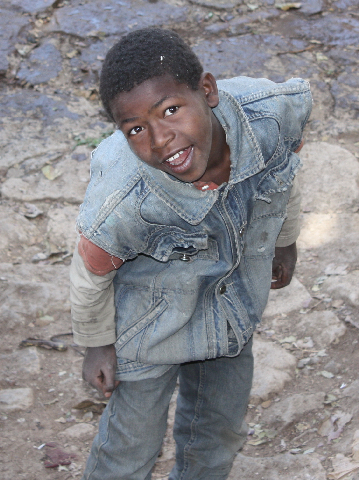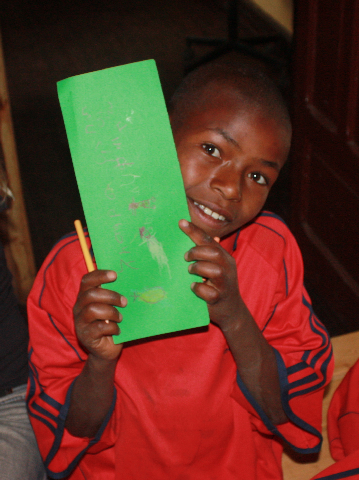Zor-zor: To wander; to walk here and there with no real objective in mind.
This month I am feeling inspired by Alemayu's journey home, so I am re-posting possibly the best blog posts ever put on TFC's website: "Zor-Zor" and "Zor-zor Part 2 - Alemayu's Homecoming". I hope you enjoy these wonderful stories of a family's reunion as much as I have.
 |
|
| Alemayu at Drop-In Center |
I think that this word, from the local language of Chencha, is an apt description of me as a child. My childhood was blissful freedom and room to roam. I was full of boundless energy and boundless curiosity. To attempt to confine me within doors must have been a miserable experience. The open woods called to me and I was bent on heeding that call. Over countless acres I would roam, content to miss both lunch and dinner. This was my domain, as many miles as I could cover and still make it home before dark. Within this domain I knew every fallen log and who had taken up residence there. I knew every bend of every creek and exactly which rock would yield a pinch from a crayfish or a glimpse of a salamander. The deer trails were my highways, always leading to newer and greater discoveries.
I would loose myself in this world. Time, a concept that I was all too aware of in the classroom, was unknown to me there. I was free and I was at home. A number of times I would find myself straining to see as I searched beneath the swift,clear water of some meandering creek. The sun had gone down on my wanderings and I was expected home.
Upon my return I would receive an adverse reaction from my parents, worry on their faces and anger in their voices. This was always surprising to me. For me the solitude of the woods was the safest place. I couldn’t possibly understand their fears.
I share a certain familiarity with the children of Ethiopia’s countryside. They are first class wanderers. They seem to be born with a natural intuition for the longest and most indirect route home. Their freedom is often restricted slightly more than mine was, as there is water to fetch and livestock to tend. However, cows and sheep seem to be surprisingly good wandering companions and there are many distractions on the way to the spring.
 |
|
Over the past couple of weeks I’ve had the opportunity to connect with one of these kindred spirits. His name is Alemayu and though it wasn’t apparent at first, I could sense some connection with him. As his story unfolded I understood that he too is a wanderer. However, his wanderings of late have been confined to the city streets.
Just four years ago Alemayu was free. Through the green hills of southern Ethiopia he would ramble far and wide, his only occupation to follow his fathers cows and sheep. He was bounded only by the steepest hills and deepest streams. Here the breezes and the springs flowed cool and clean. He knew no fears. His only cares were what wonderful new things might be waiting just behind the next hill.
One day, as he was out with his father’s animals, his life took a dramatic turn. He happened by a road, seemingly in the middle of nowhere. As he pondered where this road came from and where it might lead he heard the distant roar of a car’s engine. For curiosity sake he waited for the car to arrive. As it drove past, to his amazement, it suddenly stopped. Two men climbed out and greeted Alemayu in the customary manner. Then one of the men grabbed him and forced him to the car. The other man rummaged in the back and pulled out a large burlap bag, of the sort that is used commonly here to transport grains or potatoes. He struggled to free himself, but a boy of just 7 years was no match for two grown men. They forced him into the sack and tied him to the luggage rack on the top of the car. In this manner he traveled to the city, a full days drive if no stops are taken in between.
When they reached the city he was introduced to his new home and family, a textile mill and dozens of other boys just like himself. He spent his days at the loom laboriously working to make another man rich. There was little food and less rest. Beatings were not uncommon. By some chance he escaped and found himself trapped in yet another unpleasant world. Instead of fresh air he choked on diesel fumes. Instead of clear streams he found only filthy puddles. This is his life on the street. I now understand the fear that I saw in my parents eyes those many years ago.
Tomorrow Alemayu will be traveling with me down the same road that he traveled about 4 years ago. His home and family are near to the town of Chencha where I’ll be spending the next few months. Over the next week we will attempt to find his family and reunite them. Our hope is that Alemayu will once again be free to zor-zor.
Jonathan Bridges
